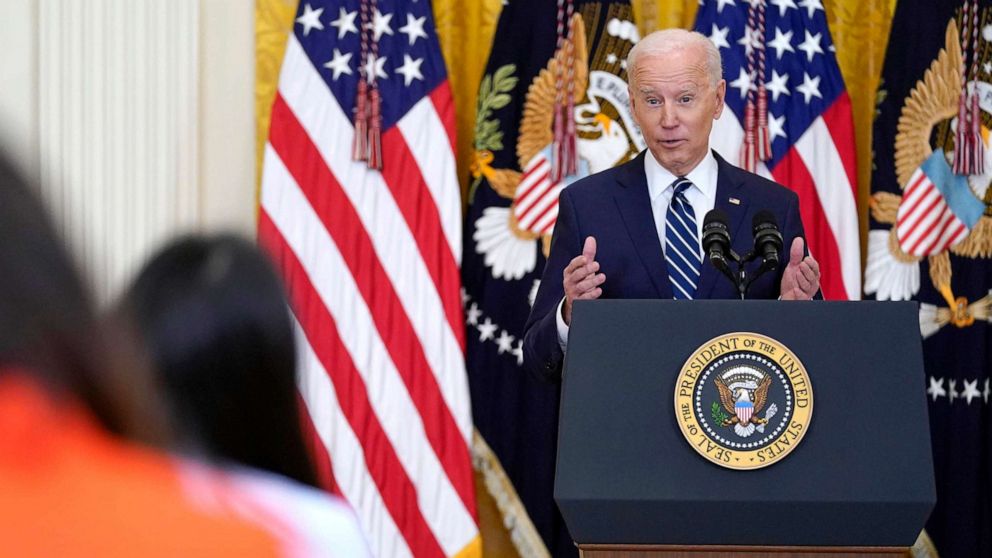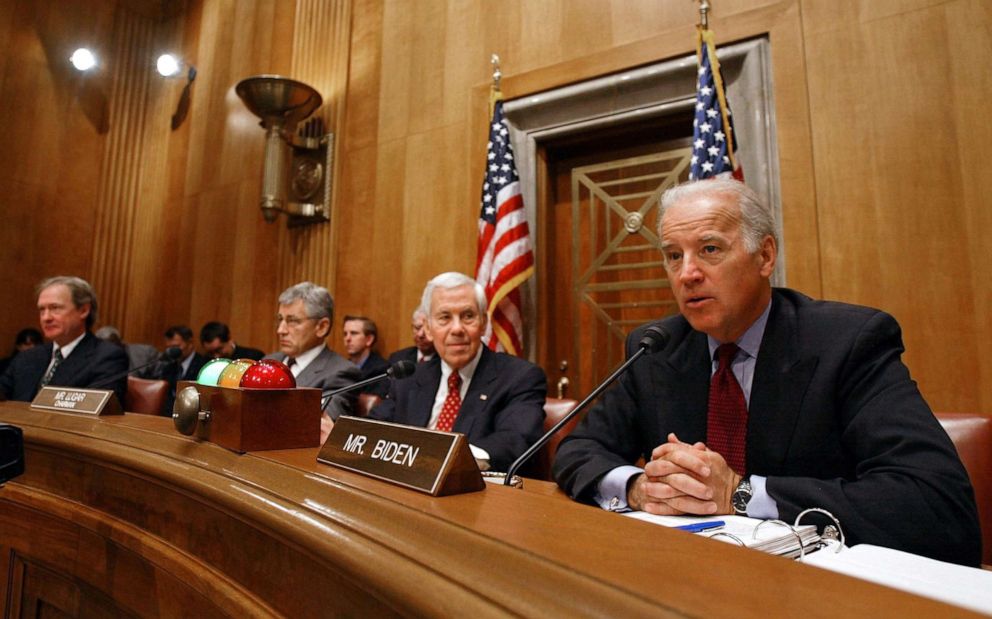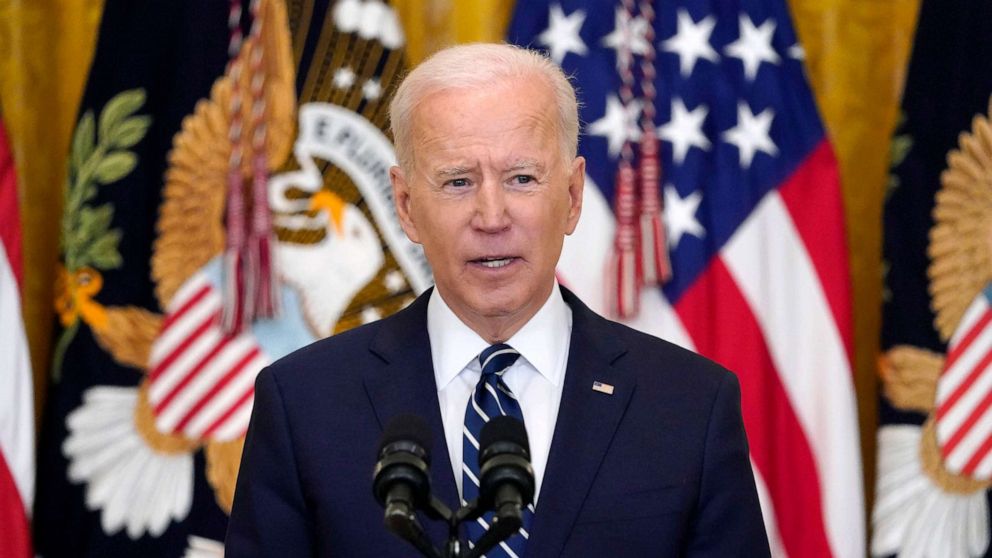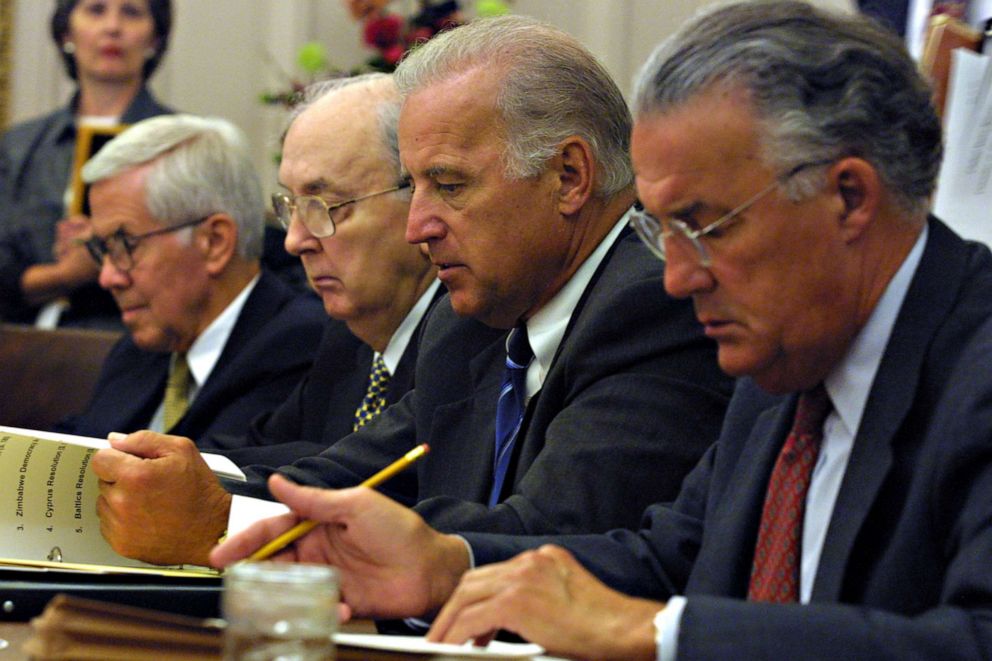为总统乔·拜登,都是时间问题。
面对前所未有的一系列危机,从冠状病毒从流行病到枪支暴力,拜登本周明确表示,在制定议程时,他正在透过历史的长镜头回顾过去。
他在周四的新闻发布会上说:“成功的总统——比我更成功——在很大程度上是因为他们知道如何安排他们正在做的事情——安排顺序,决定和优先考虑需要做的事情。”
在一周内发生两起重大枪击事件后,拜登明确表示,他认为次要的危机不会阻止他继续专注于他的首要任务:结束冠状病毒大流行和修复经济。

埃文·武奇/美联社
2021年3月25日,乔·拜登总统在白宫东厅的新闻发布会上发言。
他说,下一步将是重建美国的基础设施,这是一项不那么浮华的任务,如果他成功了,可能会对他的遗产产生持久的影响,与他之前的历届总统保持一致,比如富兰克林·罗斯福和他的“新政”,或者德怀特·艾森豪威尔和州际公路系统。
拜登的实用主义源于他在国会山几十年来通过的法案,与他的前任、前总统唐纳德·特朗普形成鲜明对比。
特朗普经常在追逐头条的同时从一个问题跳到下一个问题,对如何在宾夕法尼亚大道的另一端将他的提议真正推向终点兴趣不大。
“这是一个时间问题,”拜登周四表示,并解释了为什么他认为现在不是将政治资本用于枪支管制的时候。
“当我就职时,”他告诉另一名记者,“我认为这是一个相当基本、简单的命题,那就是:我当选是为了解决问题。我从一开始就指出,美国人民面临的最紧迫的问题是新冠肺炎和数百万美国人的经济混乱。所以这就是为什么我一开始就把所有的注意力放在——有很多问题——把所有的注意力放在处理那些特殊的问题上。”

麦智信/盖蒂影像公司
参议员约瑟夫·拜登在参议院外交关系委员会听证会上发表讲话
拜登将移民改革、气候变化、投票权和枪支控制等问题称为“长期问题”,这些问题“已经存在很长时间了”。
他说:“如果上帝愿意,我们现在能够做的就是一次一个地开始关注这些问题。”。但是,他补充说,“根本问题”是如何帮助人们重获财务健康。
总统本月早些时候会见了一群历史学家,白宫新闻秘书Jen Psaki说,这是拜登在“回顾历史”的同时“就美国面临的挑战进行公开对话”的机会。
“现在是时候后退一步,反思一下,并把它作为前进的教训,”普萨基周三说。

埃文·武奇/美联社
2021年3月25日,乔·拜登总统在白宫东厅的新闻发布会上发言。
在本月早些时候获得1.9万亿美元的冠状病毒救助计划通过后,拜登表示,他的下一个重大举措将是改善国家基础设施——“以便我们能够竞争,创造大量真正高薪的工作,”他周四解释说。
随着美国慢慢走出历史性的流行病,经济陷入困境,拜登可能会抓住时机,实施一项变革性的支出计划,该计划可能会对该国的桥梁、道路和隧道产生持久影响,并让数千名美国人重返工作岗位。
据一名白宫官员称,本周,政府官员准备向总统提交一份庞大的经济计划,涵盖基础设施和其他国内优先事项,总成本高达3万亿美元。
Axios,哪个首先报道了总统与历史学家的会面他说,会议期间很明显,拜登“非常了解富兰克林·罗斯福”,并询问了有关总统的问题,总统给美国带来了大规模的救济计划和变革性的政策变化,这些构成了20世纪30年代的新政。
白宫官员没有回答关于这次会议的具体问题,据Axios报道,这次会议持续了两个多小时,还涉及到前总统林登·约翰逊。

亚历克斯·王/盖蒂影像公司
参议院外交关系委员会成员,从左,共和党参议员理查德和杰西
但总统历史学家道格拉斯·布林克利(Douglas Brinkley)告诉美国广播公司新闻(ABC News),尽管拜登可能对罗斯福新政的影响感兴趣,但拜登面临的限制要比广受欢迎的四届罗斯福任期大得多,他也没有约翰逊那样在参议院获得民主党人的多数席位。
虽然民主党在众议院占微弱多数,但参议院的平均分裂——副总统贺锦丽打破了这种关系——意味着任何一个民主党人的反对都可能阻止法案的通过。
“事实是,拜登就像第三届奥巴马政府,”莱斯大学历史学教授布林克利说,他指的是巴拉克·奥巴马总统面临国会共和党人的阻挠。“我们是一个严重分裂的国家,在没有任何共和党人帮助的情况下完成立法议程的想法非常困难。”
尽管熟悉3万亿美元支出计划的人士强调,这些计划是初步的,价格也是初步的,但如果拜登继续前进,他可能会面临国会共和党人的强烈反对。
总统甚至无法获得一个共和党人的投票来支持新冠肺炎救助法案。
拜登周四说:“我希望共和党选举的共和党人支持我,但我现在知道的是,我得到了共和党选民的选举支持。共和党选民同意我的做法。”
周四,拜登对特朗普对共和党的持久影响点头称是,驳斥了共和党对移民改革这一问题的反对。
拜登说:“我知道他们必须保持一段时间的姿势。“他们必须把它从系统中清除出去。这是一个——但我准备好与任何想帮助解决问题并改善局势的共和党人合作。”
但拜登正面临新总统传统“蜜月期”的时间紧迫,新总统通常较高的支持率使他们能够推进更雄心勃勃的议程项目。例如,奥巴马上任后就着手进行重大医疗改革。
“自从富兰克林·罗斯福推出他的100天新政以来,总统们一直面临着迅速拿出成果的压力,因为媒体开始说,‘你在最初的100天里做了什么?’“布林克利说。”这只是媒体文化的一部分,尤其是在电视领域,尤其是在20世纪50年代。它开始成为一个巨大的试金石。"
他说,这一动态可能会推动拜登的基础设施目标。2022年中期选举也对总统产生了影响。
布林克利说:“过去总统们有一个蜜月期。“如果这种情况还存在,那也只是几个月的事情。所以你很自然地想带着大东西快速走出大门。”
Biden takes the long view: 'It's a matter of timing,' he says of presidency, agenda
For PresidentJoe Biden, it's all about timing.
Faced with an unprecedented array of crises, from thecoronaviruspandemic to gun violence, Biden this week made clear that is looking back through the long lens of history as he formulates his agenda.
"Successful presidents -- better than me -- have been successful, in large part, because they know how to time what they’re doing -- order it, decide and prioritize what needs to be done," he said during a news conference Thursday.
After two major mass shootings in a week, Biden made clear that crises he viewed as secondary would not deter him from staying laser-focused on his top priorities: ending the coronavirus pandemic and repairing the economy.
Next up, he said, would be rebuilding America's infrastructure, a not-so-flashy task that, if he's successful, could have a lasting impact on his legacy in line with consequential presidents before him, like Franklin D. Roosevelt and his "New Deal" or Dwight Eisenhower and the interstate highway system.
Biden's pragmatism is born out of his decades of passing bills on Capitol Hill, and it stands in stark contrast to his predecessor, former President Donald Trump.
Trump often bounced from one issue to the next chasing headlines, with little interest in figuring out how to actually move his proposals across the finish line at the other end of Pennsylvania Avenue.
"It's a matter of timing," Biden said Thursday, explaining why he did not think now was the time to spend his political capital on gun control.
"When I took office," he told another reporter, "I decided that it was a fairly basic, simple proposition, and that is: I got elected to solve problems. And the most urgent problem facing the American people, I stated from the outset, was COVID-19 and the economic dislocation for millions and millions of Americans. And so that's why I put all my focus in the beginning -- there are a lot of problems -- put all my focus on dealing with those particular problems."
Biden called the issues of immigration reform, climate change, voting rights and gun control "long-term problems" that have "been around a long time."
"And what we're going to be able to do, God willing, is now begin, one at a time, to focus on those as well," he said. But, he added, the "fundamental problem" was how to help people regain their financial well being.
The president met earlier this month with a group of historians, which White House press secretary Jen Psaki said was a chance to for Biden to have "an open conversation about the challenges" the United States is facing while "looking back at history."
"It's a moment to step back and reflect and use it as lessons moving forward," Psaki said Wednesday.
After gaining passage of a $1.9 trillion coronavirus relief package earlier this month, Biden said his next big push would be improving the nation's infrastructure -- "so that we can compete and create significant numbers of really good-paying jobs," he explained Thursday.
With the United States inching out of a historic pandemic and reeling economically, Biden may seize on the moment to go big with a transformative spending plan that could have a lasting impact on the country's bridges, roads and tunnels and put thousands of Americans back to work.
This week, administration officials prepared to present the president with a massive economic plan, covering infrastructure and other domestic priorities, with a total cost as high as $3 trillion, according to a White House official.
Axios, whichfirst reported on the president's meeting with historians, said it was clear during the meeting that Biden "knew a lot about Franklin D. Roosevelt" and asked questions about the president who brought the United States the massive relief programs and transformative policy changes that made up the 1930s New Deal.
White House officials did not respond to specific questions about the meeting, which Axios reported lasted over two hours and also touched on former President Lyndon B. Johnson.
But presidential historian Douglas Brinkley told ABC News that while Biden may be interested in the impact Roosevelt's New Deal had, Biden faces far greater constraints than the wildly popular, four-term Roosevelt did, nor does he enjoy a large majority of Democrats in the Senate like Johnson had.
While Democrats have a slim majority in the House of Representatives, the evenly split Senate -- with ties broken by Vice President Kamala Harris -- means that the opposition of any one Democrat could prevent a bill's passage.
"The truth of the matter is, Biden is like a third Obama administration," Brinkley, a professor of history at Rice University, said, referring to the obstructionism President Barack Obama faced from congressional Republicans. "We are a deeply divided country, and the idea of getting a legislative agenda done without any Republican help is very hard."
While people familiar with the $3 trillion spending plans stressed they were preliminary -- as was the price tag -- if Biden moves forward, he is likely to face stiff opposition from Republicans in Congress.
The president was unable to garner even one GOP vote in favor of the COVID-19 relief bill.
"I would like Republican -- elected Republican support," Biden said Thursday, "but what I know I have now is that I have electoral support from Republican voters. Republican voters agree with what I'm doing."
On Thursday, Biden dismissed Republican opposition to one issue, immigration reform, by nodding to the lasting impact Trump has had on the GOP.
"I know they have to posture for a while," Biden said. "They sort of got to get it out of their system. This is a -- but I’m ready to work with any Republican who wants to help solve the problem and make the situation better."
But Biden is running up against the time crunch of the traditional "honeymoon period" for new presidents, where their typically higher approval ratings allow them to push through more ambitious agenda items. Obama, for example, tackled major healthcare reform soon he took office.
"Since Franklin D. Roosevelt unleashed his 100 days of the New deal, there's been pressure on presidents to deliver results quickly, because the press starts saying, 'What did you do in your first 100 days?'" Brinkley said. "This is just part of a media culture that's developed particularly now with TV, especially in the 1950s with television. It starts becoming this big litmus test."
That dynamic is likely fueling Biden's infrastructure goals, he said. The 2022 midterms, too, are bearing down upon the president.
"There used to be a honeymoon period for presidents," Brinkley said. "If that exists anymore, it's only for a couple of months. And so you're naturally trying to get out of the gate with something big quickly."






